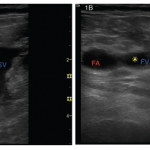‘The whole point is that [lupus patients] are at a higher risk of developing a thromboembolism, so they should be considered for prophylactic anticoagulation.’ —Dr. Kishore
Consider VTE Prophylaxis
It is well known by physicians nationwide that patients are at risk for VTE if they are admitted to a hospital, regardless of whether they have lupus, Dr. Kishore says. Nevertheless, findings from several studies suggest patients at risk are not always given VTE prophylaxis while they are in the hospital, which leads to even higher mortality or a longer length of stay for lupus patients, she says.

Dr. Majithia
“The whole point is that [lupus patients] are at a higher risk of developing a thromboembolism so they should be considered for prophylactic anticoagulation,” Dr. Kishore says.
Factors that contribute to an increased risk of VTE for lupus patients include antiphospholipid antibody syndrome, chronic inflammation, kidney involvement and steroid treatment leading to sluggish blood flow. These patients also have a higher risk of developing diabetes, high cholesterol and high blood pressure, which can increase the risk of blood clots, Dr. Kishore says.
The study authors recommend hospitalized patients with lupus be screened for VTE and offered prophylactic anticoagulation to reduce the risk of thromboembolism. Education and further study on the risk for VTE, symptom monitoring and the development of a prophylactic strategy for hospitalized lupus patients are also needed, says Dr. Kishore.
“It’s very important rheumatologists be aware of these findings and educate other physicians in their community,” she says.
Catherine Kolonko is a medical writer based in Oregon.
Reference
- Kishore S, Jatwani S, Malhotra B, et al. Systemic lupus erythematosus is associated with a high risk of venous thromboembolism in hospitalized patients leading to poor outcomes and a higher cost: Results from nationwide inpatient sample database 2003–2011. ACR Open Rheumatology. 2019 May 13;1(3):194–200.



